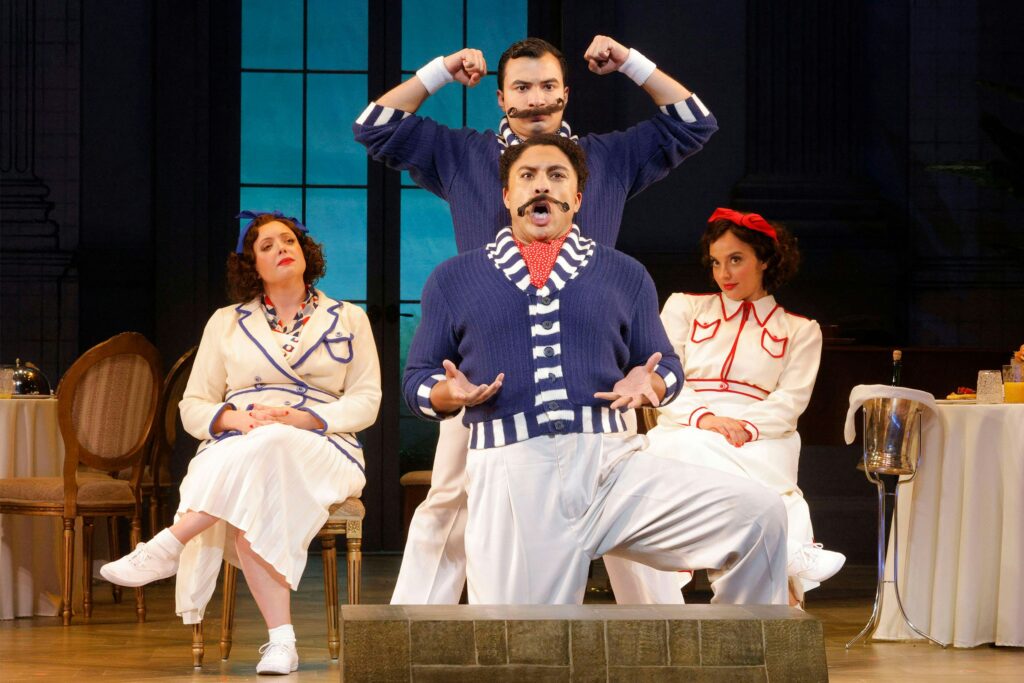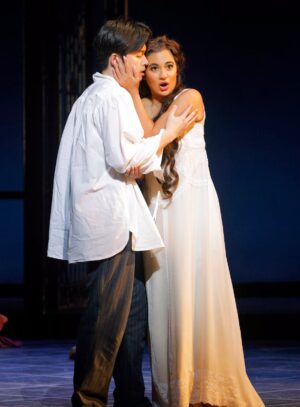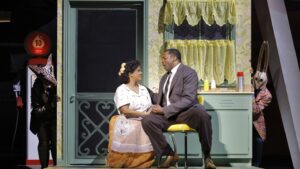I have never experienced being targeted for so much online advertising with any opera production than I was with than the COSI FAN TUTTE currently playing at LA Opera. Having never watched LOVE ISLAND, I can’t vouch for the director’s declaration that COSI is Mozart’s LOVE ISLAND. But I can attest to the happy crowds attending the opera.
Mozart’s COSI FAN TUTTE was his final opera written in collaboration with Lorenzo da Ponte, but it never shared the same venerated space as their other collaborations, LE NOZZE DI FIGARO and DON GIOVANNI.Beethoven famously found the opera immoral, and Victorian producers and audiences tended to agree.
And, like certain late Shakespeare plays, the opera defies easy classification. COSI confounded the public by seducing them with the exterior trappings of a frivolous farce, then slyly demanding that they face uncomfortable questions about fidelity and the nature of the sexes. Performances of the opera didn’t become common until the middle of the 20th Century.
Director Shawna Lucey, reviving a production by the late Michael Cavanaugh, leans into the farcical elements, but it all works because her talented cast are all on the same page tonally. The decision to place the production in an exclusive 1930’s country club is brilliant. Like the screwball and pre-Code comedies of the era, da Ponte’s libretto challenges masculinity and wittily dissects the battle of the sexes. The direction includes homages to many of the films, but the most overt is the ladies exercise class, courtesy of George Cukor’s THE WOMEN.
Appropriately enough, the production opens in a locker room where dewy-eyed young soldiers, Ferrando (Anthony Leon) and Guglielmo (Justin Austin), extol the virtues of their respective fiancées, who also happen to be sisters. A worldly-wise Don Alfonso (Rod Gilfry) decides to teach them about love’s limitations in the form of a wager on the ladies’ fragile fidelity. The men will be called up to join their military unit and return, disguised as “Albanians;” to woo the ladies, Dorabella (Rihab Chaieb) and Fiordiligi (Erica Petrocelli). This casually cruel wager will motivate and animate the plot and its contrivances.
Gilfry has been a mainstay with LA Opera from its earliest seasons and has shown his versatility as an actor and a singer in numerous roles. And, if the vocal sheen of his youth has become more rough-hewn, it only adds character to his sound. Leon can stand comparison with the finest of Mozartian tenors. The voice is beautiful, stylish, and effortlessly produced with a seemingly endless supply of breath to spin out the composer’s long phrases without strain. He is also a winning performer, up for all the hijinks in the direction. Austin is both physically and vocally a wonderful counterpart for Leon. His singing is vigorous and pointed, and his acting is sexually charged and volatile.
The ladies don’t have quite as much physical comedy, but they are just as willing to throw themselves into the comic mayhem. No querulous divas here. Chaieb’s voice is lush and sweet sounding. As the first of the sisters to consider actively responding to the Albanians overtures, Chaieb’s Dorabella is quick to accept her new passion, while remaining delightfully loopy. Petrocelli’s Fiordiligi does her best to control her feelings as attested in her well sung “Come Scoglio,” a fiendishly difficult aria that has left many sopranos in the dust. As Don Alfonso needs help in his plans, he turns to Despina (Ana Maria Martinez) to do the real heavy lifting. Actually, it appears that she may be running the whole country club. Martinez is an irresistibly feisty Despina with terrific timing and an eminently practical understanding of her abilities. And she neatly steals the scene in every appearance.
Normally, the chorus in COSI has very little stage time, but the director has added them to many scenes with hilarious results. Plus, they all seem to be having the best time either at the swimming pool, or the life drawing session, or the aforementioned exercise class.
Erhard Rom’s set designs are the perfect backdrop for this frothy comedy, and each successive setting is more delightful than the last. Constance Hoffman’s witty costumes did Yeoman’s work in keeping us firmly in the period as well as adding an incisive personal insight to each of the characters.
One is always in good hands when James Conlon is conducting, but his work with Mozart is particularly special. Certainly, there’s the clarity of the sound and the orchestral details, but he also completely understands the pacing that Mozart requires. He knows the difference between racing through and having energy. And he never puts a foot wrong with any style of music I’ve heard him conduct.
This production is truly a winner and, as if that isn’t enough, a clever directorial moment has been added for Dorabella and Fiordiligi at the end. It feels like an echo from a fairly obscure play and an even more obscure film, THE GUARDSMAN. But you don’t have to know the reference to enjoy the possibility of the women turning the tables.
Dorothy Chandler Pavilion March 8 – March 30, 2025 laopera.org






